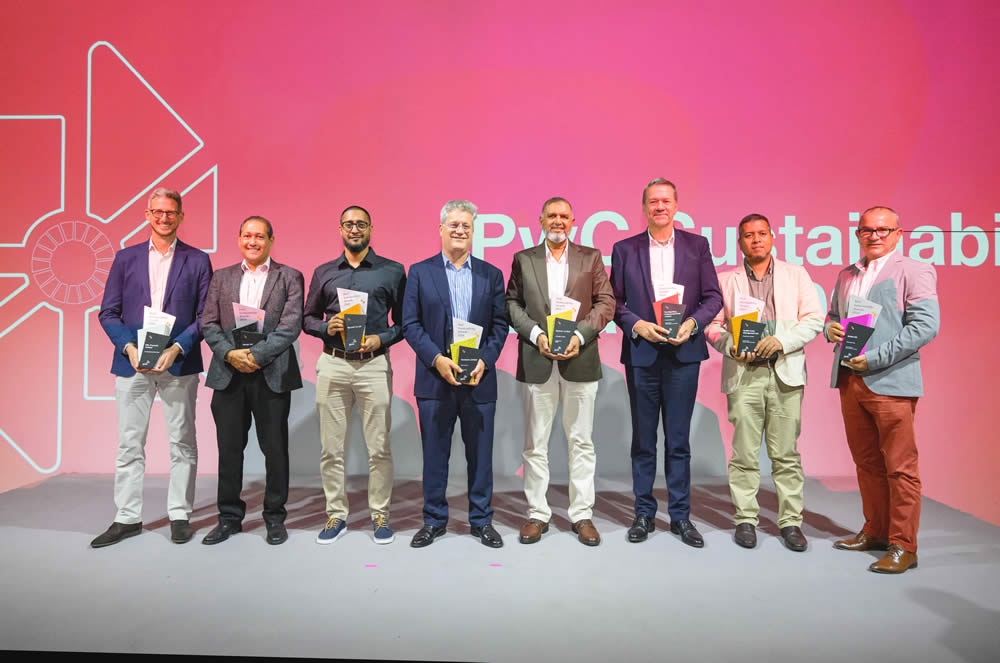
The second edition of the PwC Sustainability Awards, held on 17 September 2024 at the House of Digital Art, celebrated organisations across various key sectors of the Mauritian economy for their remarkable sustainability initiatives.
For this year’s edition, seven categories were eligible to participate and after a thorough review process, the four Judging Panel members decided to also remit an 8th trophy, the ‘Special Jury’s Award’ to acknowledge an exceptional submission. The evening awardees are:
Transport and Logistics - Velogic Ltd
Agro-Industry - Omnicane Limited
Construction and Real-Estate - ENL Property Limited
Wholesale and Retail - Batimex Limited
Manufacturing - Sofap Ltd
Hospitality and Tourism - Sunlife Hotel Management Ltd
Financial Services - The Mauritius Commercial Bank Limited
Jury’s Special Award - Morivert Co Ltd
The panel of four independent jury members of the Judging Panel meticulously evaluated the entries based on quantitative and qualitative Key Performance Indicators (KPIs), assessing submissions against four key sustainability criteria:
● Reported Data
● Integration with Business Strategy
● Impact
● Innovation
The event featured an opening address by Anthony Leung Shing, PwC Deputy Regional Senior Partner for East Market Area (EMA) and Country Senior Partner for Mauritius, a keynote speech by Mrs. Jessica Fries, Executive Chair of Accounting for Sustainability (A4S) and finally the Judging Panel findings and Award Ceremony by Julien Tyack, PwC Mauritius Partner and Sustainability Leader.
Anthony Leung Shing opened the event by emphasising that sustainability is a critical issue that demands our full attention, as it has the potential to significantly impact the future of a nation and its people. He noted: “The global dialogue surrounding sustainability is evolving at an unprecedented pace. Transparency, accountability, and action are no longer aspirations but necessities in today’s sustainability landscape. PwC Mauritius is committed to sustainability, emphasising diversity and inclusion, equal pay, and achieving net-zero emissions. The PwC Sustainability Awards is our own way to honour the companies whose commitment to sustainability has inspired us all. Their dedication to a long-term vision reminds us that business success and the well-being of our communities and ecosystems are deeply interconnected.”
Jessica Fries, shared how the sustainability space was evolving globally, she elaborated: “As regulations shift toward broader requirements—encompassing environmental, social, and economic aspects—staying informed is crucial. Even well-established companies with decades of reporting experience have faced resource challenges when responding to new EU requirements. The market demands early action. While investor information needs to drive current developments, companies recognise the broader impact beyond investors. Starting early and embracing sustainability reporting is essential. Sustainability reporting isn’t just about ticking boxes; it’s about driving meaningful decisions and outcomes. In a world grappling with climate change’s impact on lives and livelihoods, reporting becomes fundamental.”
Julien Tyack addressed the audience by sharing some best in class sustainability reporting practices globally over the past 12 months: “Recent advancements in sustainability include comprehensive biodiversity assessments via the Taskforce on Nature-related Financial Disclosures, increased focus on supply chain transparency, and the growing influence of double materiality which considers both financial and environmental/social factors. AI is improving sustainability data accuracy, while detailed reporting on circular economy initiatives is becoming more common.”
Julien Tyack then focused on the findings of the PwC Sustainability Awards 2024, sharing insights into the evaluation process and the progress that Mauritian companies were making. He stated, “This year shows positive steps in sustainability, with many participants developing strategies. However, there is still room for improvement, as sustainability is not yet fully integrated into core strategies, and material issues are not always being assessed. While progress has been made in adopting global reporting standards, most companies are still not applying them fully. Board oversight has also strengthened, with more companies including sustainability in their top governance structure. Nevertheless, reporting on gender remains poor, as some companies have not set clear targets or fully disclosed relevant data. Companies are encouraged to focus on accurate and credible reporting to maintain transparency and build stakeholder confidence.“
As the spokesperson for the Independent Jury panel, Julien Tyack highlighted both the positive outcomes and the significant gaps identified during the evaluation:
Positives
● Circular Economy: Many industries are embedding circular economy principles into their operations, promoting waste reduction, repurposing, and recycling.
● Waste Management: Strong waste management practices are emphasised, with various sectors making significant strides in reducing waste.
● Transition to a Low-Carbon Economy: Several industries are implementing strategies and taking actionable steps toward transitioning to a low-carbon economy.
Gaps
● Lack of Commitment to Net Zero Emissions: Many industries have not committed to achieving net zero emissions or set clear targets for reducing their carbon footprint.
● Outdated or Incomplete Data: Several sectors struggle with using outdated data, which hampers progress, or have incomplete data, particularly regarding carbon emissions and waste management.
● Insufficient Materiality Assessments: Materiality assessments are either not conducted or poorly executed, limiting the ability to identify and prioritise key sustainability issues.
● Limited Disclosure of Social Metrics: There is often a lack of disclosure on social metrics, including gender diversity, social impacts, and community engagement.
● Participation and Engagement: Some companies in Mauritius are still hesitant to participate in fear of not being ready yet, and PwC stressed that sustainability is a journey and not a race
Julien Tyack acknowledged the challenges today’s CEOs face in advancing sustainability agendas, and provided some advice:
● Take time to embed the right sustainability strategy
● Don't wait for regulations to start your sustainability journey
● Set yourself targets on gender balance
● Report only on what can pass the audit test